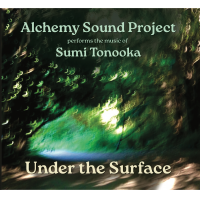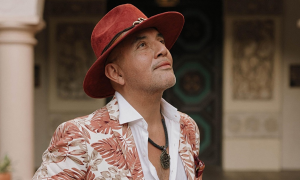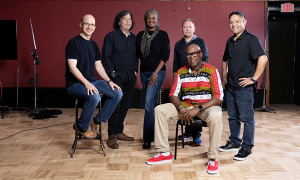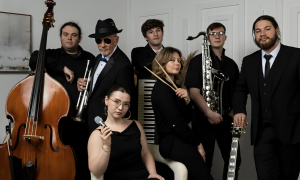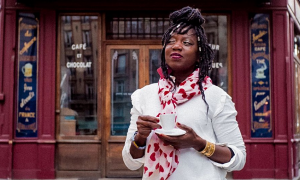Home » Jazz Articles » Take Five With... » Take Five With Jake Hanlon
Take Five With Jake Hanlon
 Performer, composer and educator, Jake Hanlon currently resides in Antigonish Nova Scotia, a Professor of Music at Saint Francis Xavier University.
Performer, composer and educator, Jake Hanlon currently resides in Antigonish Nova Scotia, a Professor of Music at Saint Francis Xavier University. A native of Nova Scotia Canada, Hanlon has had the opportunity to work some of the brightest and talented students and teachers in the world. In 2003 he graduated with Honors from Saint Francis Xavier University with a Bachelor of Music in Jazz Studies. In 2007 he was hired as a Graduate Teaching Fellow at the University of North Texas. The Fellowship Duties included instruction of private lessons, Performance Fundamentals and direction of the UNT L5 and Super 400 Guitar Ensembles, the L5 ensemble being one of the foremost College Guitar Ensembles in the World.
Instrument(s): Guitar.
Teachers and/or influences? Teachers:
Fred Hamilton, 
Lynn Seaton
bassb.1957
Jim Hall
guitar1930 - 2013

John Abercrombie
guitar1944 - 2017

Wayne Shorter
saxophone1933 - 2023

Kenny Wheeler
flugelhorn1930 - 2014

Joe Henderson
saxophone1937 - 2001

Chris Potter
saxophone, tenorb.1971

Dave Holland
bassb.1946

Keith Jarrett
pianob.1945

Oscar Peterson
piano1925 - 2007

Freddie Green
guitar, acoustic1911 - 1987

Grant Green
guitar1935 - 1979

Wes Montgomery
guitar1923 - 1968

Pat Metheny
guitarb.1954

John Scofield
guitarb.1951
I knew I wanted to be a musician when...
I discovered my need to be a musician at the age of 20. Prior to that I was a musician, someone who played but did not understand how important it was to me until I returned to music full time.
Your sound and approach to music: Music is about emotion and communication. When I play I need to feel something. Aside from the technical aspects of jazz, the emotional aspect of it is what connects me to it the most. It could be the fun of playing with a superior player or the dread of a big performance. The passion of a well played ballad, the energy of a burning composition. It sustains me and makes me feel more alive.
Your teaching approach: To give the students a strong basis in the fundamentals of the music so that he or she can proceed to begin playing as quickly as possible with other people. Playing the music is the best way to learn it and from there the student can continue private study to guide them in how to fix what they cannot fix themselves.
Your dream band:

John Taylor
piano1942 - 2015

Dave Holland
bassb.1946

Peter Erskine
drumsb.1954
Road story: Your best or worst experience: I remember a gig I took out in Texas at an amateur airplane club. I was told it was 50 bucks a man plus free food, lots of food as it was a Texas style BBQ. I was hungry and a student so I took it. The gig day came around and I was told that the drummer would be the wife of the organizer's 13 year old son who "liked jazz" and owned one album, a Miles Davis CD of compiled music.
It was brutal.
Favorite venue: I have no favorite venue.
Your favorite recording in your discography and why? My debut CD is out soon, I must say that one.
The first Jazz album I bought was: First jazz album I fell in love with was 
Miles Davis
trumpet
1926 - 1991
What do you think is the most important thing you are contributing musically? That question for me is impossible to answer since I still am finding my voice.
Get back to me in 20 years maybe.
Did you know... I was a pretty decent classical bass trombonist!
CDs you are listening to now:
Jonathan Kreisberg
guitar
b.1972
Jesse van Ruller
guitar
b.1972
Kenny Wheeler
flugelhorn
1930 - 2014
Kenny Wheeler, Angel Song (ECM);
Pat Metheny, Day Trip (Nonesuch).
Desert Island picks:
Miles Davis, Miles Smiles;
Sonny Rollins
saxophone
b.1930
John Coltrane
saxophone
1926 - 1967
Joe Henderson
saxophone
1937 - 2001
Stevie Wonder
vocals
b.1950
Pat Metheny, Bright Size Life;
Wes Montgomery
guitar
1923 - 1968
John Scofield, Works for Me;
Jim Hall, These Rooms;
Pat Martino
guitar
1944 - 2021
Kenny Wheeler, Widow in The Window;
John Abercrombie
guitar
1944 - 2017
Tom Harrell
trumpet
b.1946
Kurt Rosenwinkel
guitar
b.1970
How would you describe the state of jazz today? I would describe it as underground counterculture.
What are some of the essential requirements to keep jazz alive and growing? My faith is that jazz will always be there, yet popularity will always be low. We live in a society driven by instant gratification and financial worries and not about culture and the humanities. Perhaps some day we will return there, but by then other things will have evolved to take over the roll jazz played at it's height of popularity.
What is in the near future? I have a recording that will be coming out this fall featuring my own compositions that will be released on Armored Records. Currently I'm teaching at STFX University in Atlantic Canada. I have some other projects that I am working on including possibly an album with my Brother Josh and another album of my own sometime in 2010.
By Day: I don't consider my teaching position to be separate from my musical career.
If I weren't a jazz musician, I would be a: I would be an unhappy person. I don't know what I would be doing. Hopefully something that focuses on the person not the pocketbook. Something that contributed to parts of our society that too few people contribute to.
Tags
Comments
PREVIOUS / NEXT
Support All About Jazz
 All About Jazz has been a pillar of jazz since 1995, championing it as an art form and, more importantly, supporting the musicians who make it. Our enduring commitment has made "AAJ" one of the most culturally important websites of its kind, read by hundreds of thousands of fans, musicians and industry figures every month.
All About Jazz has been a pillar of jazz since 1995, championing it as an art form and, more importantly, supporting the musicians who make it. Our enduring commitment has made "AAJ" one of the most culturally important websites of its kind, read by hundreds of thousands of fans, musicians and industry figures every month.








 Buy Now
Buy Now



